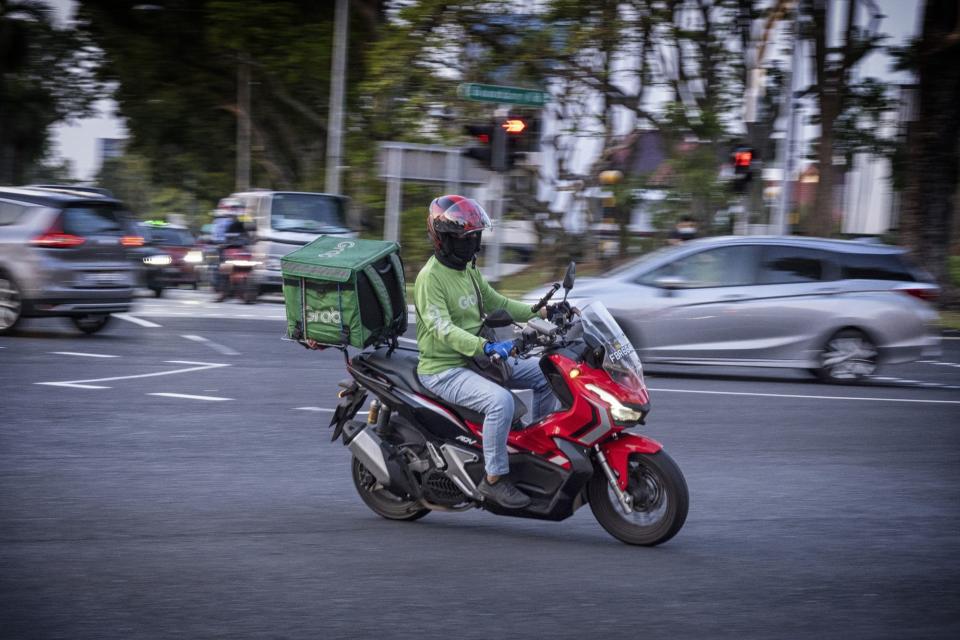Singapore’s Grab Falls After Reporting Wider-Than-Estimated Loss

(Bloomberg) -- Grab Holdings Ltd. shares tumbled after it reported a wider loss than analysts had estimated, a sign of the challenges in turning its ride-hailing and delivery businesses profitable.
Most Read from Bloomberg
Adani Becomes World’s Third Richest Trailing Only Musk, Bezos
There’s a New Recession Canary in the Coal Mine, Morgan Stanley Says
Mikhail Gorbachev, Soviet Leader Who Ended Cold War, Dies at 91
Elon Musk Attacks Twitter Deal Over Whistle-Blower as Feud Escalates
The Singapore-based company said its net loss for the second quarter was about $547 million, contracting almost 30% from a year earlier. Still, that was more than the $335 million loss analysts had projected, according to data compiled by Bloomberg. Grab shares tumbled 12% in US trading and are now down more than 55% this year.
Grab’s revenue rose a better-than-expected 79% to $321 million, buoyed by resilient demand from consumers who continued to hail rides and order food despite worsening inflation. That beat the $273.1 million average of analysts’ estimates compiled by Bloomberg.
Grab, which had been one of Southeast Asia’s hottest startups and is led by Anthony Tan, has struggled since it went public via a merger with a US blank-check company last year. Its shares have dropped since then as losses piled up during pandemic-era lockdowns and money-losing companies have fallen out of favor with investors.
To combat the downturn in ride-hailing, Grab had pivoted to expand into groceries and made a significant investment. But the company said yesterday it decided to shut its dark-store operations in Singapore, Vietnam and the Philippines to cut costs and streamline its deliveries operations, retreating from the earlier strategy.
Now Tan must navigate through an era of rising inflation that could dampen demand just as Grab is trying to emerge from Covid challenges. The company has faced increasing competition from GoTo Group and Sea Ltd.
Grab said its gross merchandise value will expand 21% to 25% this year, compared with 30% to 35% it had projected previously.
Grab anticipates some softening of the food delivery demand, said Chief Executive Officer Tan in a conference call on Thursday.
“That’s why we lowered our GMV estimates,” he said.
The company reported $2.5 billion in GMV for its delivery arm, which was once touted as a key growth area. That fell short of its own projections of up to $2.65 billion for the quarter as consumers ordered less takeout and groceries online after pandemic-era restrictions receded.
While the company’s overall second quarter results were “solid,” deliveries GMV came in below expectations and total net loss was wider than Citigroup’s estimate, analyst Alicia Yap said in a report.
Key Insights
Second-quarter revenue from Grab’s delivery business almost tripled to $134 million.
Revenue from its mobility arm gained 37% to $161 million.
Revenue from financial services rose to $13 million.
Grab’s cash and cash equivalents fell to $2.8 billion at the end of June from about $3.4 billion at the end of March.
Partner incentives climbed 23% to $212 million, while consumer incentives rose 28% to $311 million.
Monthly transacting users grew 12% to 32.6 million.
Get More
Earlier this month, Grab and rivals Foodpanda and Deliveroo Plc formed an unlikely partnership to strengthen their influence with the Singapore government as it considers laws that could transform the gig economy. Legislation that seeks to protect the interest and safety of thousands of drivers could impact companies like Grab, who have benefited from having people work for them without shouldering traditional responsibilities of a direct employer.
Grab’s GMV, the sum of transactions flowing through its platform, rose 30% to $5.1 billion.
Grab expects deliveries GMV to hit as much as $2.5 billion in the third quarter; mobility GMV to reach up to $1.1 billion; TPV for financial services to rise to as much as $3.9 billion.
Market Reaction
Grab shares fell 12% to $3.16.
(Updates with shares from the second paragraph)
Most Read from Bloomberg Businessweek
YouTube Went to War Against Terrorists, Just Not White Nationalists
The Secret Sauce at Hot Chicken Takeover: Its Unique Workforce
Chipmaking’s Next Big Thing Guzzles as Much Power as Entire Countries
©2022 Bloomberg L.P.

 Yahoo Finance
Yahoo Finance 